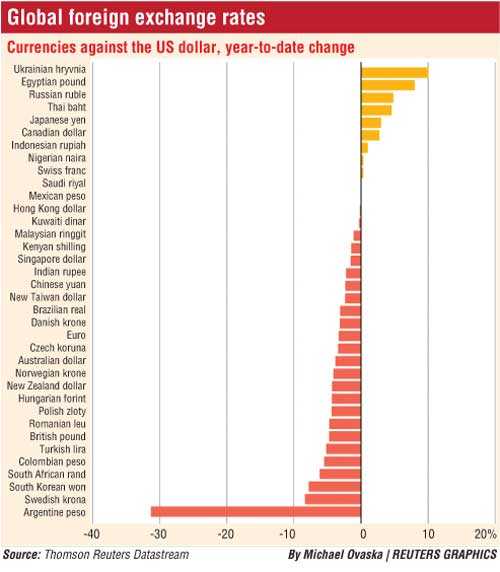Sunday Feb 22, 2026
Sunday Feb 22, 2026
Tuesday, 20 August 2019 00:09 - - {{hitsCtrl.values.hits}}
TOKYO (Reuters): Safe-haven currencies such as the yen and Swiss franc were under pressure on Monday as expectations policymakers would unleash new stimulus eased immediate concerns about a slowing global economy. 
Such hopes found support from the Chinese central bank’s interest rate reforms over the weekend, seen lowering corporate borrowing costs, and reports of new fiscal stimulus in Germany.
However, investor optimism is likely to be capped ahead of a US decision due later on Monday on whether to continue to allow China’s Huawei Technologies to buy supplies from American companies.
“Huawei is a big test to see whether the current risk-on mood will continue in the currency market,” said Takuya Kanda, general manager of the research department at Gaitame.com Research Institute.
“There’s a sense of calm right now because the stimulus story is supporting the dollar against safe-havens, but I’m not sure how long this calm will last.”
The dollar index, which measures the greenback against six major currencies, was marginally higher in Asia at 98.192, close to a two-week high of 98.339 reached on Friday. Against the yen JPY=EBS, the dollar was little changed at 106.44 yen, near a one-week high of 106.98 yen.
The yen, which tends to be bought as a safe-haven during times of economic uncertainty, fell slightly on Monday versus the antipodean currencies.
Risk sentiment could improve further if the US government offers some concessions to Huawei, which makes a resolution to the trade war more likely.
In May, the US government blacklisted Huawei, accusing the world’s largest telecom equipment maker of espionage and intellectual property theft. The allegations, which Huawei disputes, were a serious escalation in the US-China trade war.
The US Commerce Department is expected to extend a reprieve given to Huawei Technologies that permits the Chinese firm to buy supplies from US companies so that it can service existing customers, two sources familiar with the situation told Reuters on Friday. However, US President Donald Trump on Sunday said he did not want the United States to do business with China’s Huawei or national security reasons, casting doubt over the decision.
While a rejection for Huawei could easily fuel another bout of risk aversion, risk-sensitive currencies appeared to have found some support for now.
The Australian dollar rose 0.2% to 72.21 yen AUDJPY=, while the New Zealand dollar rose 0.1% to 68.36 yen NZDJPY=.
Gold, another safe-haven asset, fell 0.3% in the spot market XAU= to $1,509.30 per ounce.
The People’s Bank of China unveiled a key interest rate reform on Saturday to help steer borrowing costs lower for companies and support a slowing economy that has been hurt by the trade war with the United States.
Details of Chinese stimulus came after German media reported that the German government may be open to running a fiscal deficit to boost growth.
China and Germany are two major global exporters that play a crucial role in world trade, so any steps to bolster these two economies is a positive for the global economic outlook.